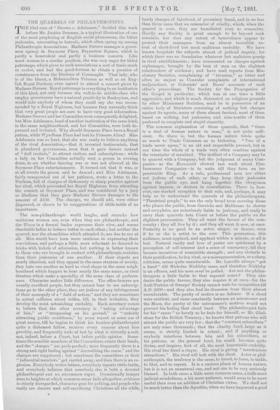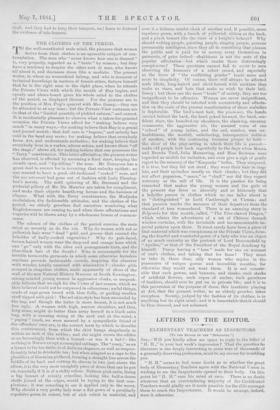THE QUARRELS OP PHILANTHROPISTS.
THE libel case of " Sievers v. Adelmann," decided this week before Mr. Justice Denman, is a typical illustration of one of the most perplexing of English social phenomena, the bitter jealousies, amounting to hatreds, which often spring up among Philanthropic Associations. Madame Sievers manages a gover- ness agency in Seymour Place, Bryanston Square, which is partly a benevolent and partly a business concern. Like most women in a similar position, she was very eager for titled patronage, which gives to such associations a sort of trade-mark or cachet, and had the good-fortune to obtain a promise of countenance from the Duchess of Connaught. That lady, who is of the bluest, a Hohenzollern Princess as well as an Eng- lish Royal Duchess, even agreed to attend a concert given by Madame Sievers. Royal patronage is everything to an institution of this kind, not only because the well-to-do middle-class who employ governesses have a natural proclivity to flunkeyism, and would take anybody of whom they could say she was recom- mended by a Royal Highness, but because they naturally think that very great people are sure to have very good information, Madame Sievers and her Committee were consequently delighted, but Miss Adelmanu, head of another institution of the same kind, in the same neighbourhood, and her Committee, were both de- pressed and irritated. Why should Seymour Place have a Royal patron, while Wyndham Place had lost ita Princess Alice.? Miss Adelmanu was so hurt, that she was ready to believe anything of the rival Association,—that it invented testimonials, that it plundered governesses, even that it gave dances instead of " dull recitals," to attract visitors and subscriptions ; while a lady on her Committee actually sent a groom in evening dress, to see whether dancing was or was not allowed at the Seymour-Place entertainments, It turned out that it was, or at all events the groom said he danced; and Miss Adelmanu, fairly exasperated out of her patience, wrote a letter to the Duchess, full of charges of dishonesty or sharp practice against her rival, which prevented her Royal Highness from attending the concert at Seymour Place, and was considered by a jury so libelous that they gave Madame Sievers damages to the amount of £130. The charges, we should add, were either disproved, or shown to be exaggerations of tittle-tattle of no importance.
The non-philanthropic world laughs, and remarks bow malicious women are, even when they are philanthropic, and the Timer?. in a formal leader expresses their view, and warns charitable ladies to behave better to each other ; but neither the quarrel, nor the absurdities which attended it, are due to sex at all. Men would have been more cautious in expressing their convictions, and perhaps a little more reluctant to descend to tricks with tickets of admission, but nothing is better known to those who are brought in contact with philanthropic societies than their jealousies of one another. If their objects are nearly identical, and they appeal to the same stratum of society, they hate one another as hard as rival shops iu the same neigh- bourhood which happen to bear nearly the same name, or rival theatres which make a speciality of the some class of perform- ance. Character makes little difference. The office-bearers are usually excellent people, but they cannot bear to see subscrip- tions go to the other place, they are jealous of any infringement of their monopoly of a " field of action," and they are sometimes in actual collision about trifles, till, in their irritation, they develop the most astonishing credulity. Each secretary comes to believe that the other secretary is " taking advantage of him," or " trespassing on his ground," or " unfairly attracting public confidence," by some report or some use of great names, till ho begins to think his brother-philauthropist quite a dishonest fellow, receives every rumour about him greedily, and frequently ends at last by what is virtually a suit, not, indeed, before a Court, but before public opinion. Some- times the sensible members of the Committees retain their heads, and the " charges " are pooh-poohed ; more frequently there is a strong and right feeling against " discrediting the cause," and the charges are suppressed ; but sometimes the committees or their " influential members" get carried away, and then there is an ex- plosion. Everybody writes letters, everybody repeats tittle-tattle, and everybody believes that somebody else is both a devoted philanthropist and an uncommon rogue. Occasionally temper ,rises to heights at which common-sense fails altogether, evidence is utterly disregarded, character goes for nothing, and people who really are sincere and self-sacrificing Christians all the while,
bandy charges of falsehood, of pecuniary fraud, and in no less than three cases that we remember of cruelty, which, when the quarrel is over, they are humiliated even to remember.
Hardly any Society is great enough to be beyond such scandals, nor does auy extent of benevolence appear to protect their managers from an almost incredible ex- tent of short-lived but most malicious credulity. We have known hospitals the subjects almost of judicial inquiry, for which there was no foundation whatever but malicious gossip
in rival establishments; have commented on charges against orphanages, brought by the best of men on the slightest
substructure of evidence ; and have read reports from Mis- sionary Societies, complaining of " invasion," as bitter and often as unjust as Consular complaints of international malpractices, or Colonists' and Boers' accounts of each other's proceedings. The Society for the Propagation of the Gospel in particular, which was at one time a little aggressive, and which is much distrusted on religions grounds by other Missionary Societies, must be in possession of an entire body of literature consisting of nothing but charges against its agents, many of them almost farcical, most of them based on nothing but jealousies, and nine-tenths of them preferred in complete and stupid sincerity.
The common explanation of these quarrels, that " there is a deal of human nature in man," is not quite suffi- cient. So there is, but the human nature tends quite as much to Trade Unionism as to bickering. " Two of a trade never agree," is an old and respectable proverb, but in our time the whole of a trade very often combine against the remainder of mankind. The instinct of a Company may be to quarrel with a Company, but the judgment of many Com- panies—as the Ecoizomist showed. last week about Fire- Insurance Companies—is to unite till they form an im- penetrable Ring. As a rule, professional men are either not jealous of each other, or they keep their jealousies from the public eye, and hang together like clergymen against laymen, or doctors in consultation. There is, how- ever, one marked exception to. that rule, and, perhaps, it may help us to understand the quarrels of the philanthropists. "Theatrical people," to use the only broad term covering those who please the public, from Garricks and Malibrans to clowns and coryph6es, are notoriously liable to jealousy, and ready to carry their quarrels into Court or before the public on the slightest provocation. They all want the favour of the com- munity ; they all live by it ; and they all want it now, at once. Posterity is no good to an actor, singer, or dancer, even if he or she is artist to the core. This generation, this audience, must applaud, and applaud within a minute, or all is lost, Natural vanity and love of praise arc quickened by a perception of self-interest and a sense of emergency, till they become incentives of irresistible strength ; and auy obstacle to their gratification, be it a rival, or a misrepresentation, or a sharp criticism, seems quite unendurable. Mr. Lenville always "got a hand" till Nicholas Nickleby came, and therefore Nickleby is an offence, and his nose must be pulled. Are not the philan- thropists a little liable to that especial snare ? They also desire the public favour, they also require it at once—for the Anti-Torture of Sweeps' Society cannot wait for recognition till A.D. 2Q00—and they also find its diversion from them almost unendurable. The purity of motive is no defence. if a cloud were sentient, and came constantly between an astronomer and the Moon, the purity of the astronomer's motives would not prevent his hating that cloud hard. The philanthropist feels for his "cause " as keenly as he feels for himself, or Mr. Glad- stone for the British Treasury ; he knows that patrons who will attract the public are very few ; that the "constant subscribers" are only some thousands ; that the charity fund, large as it seems, is strictly limited in extent ; and if anything or anybody interferes between him and his subscribers, or his patrons, or the general fund, his wrath becomes quite divine, and inspires, first of all, the most lamentable credulity. His rival has hired a claque. His rival is giving " meretricious attractions." His rival will bolt with the chest. Actor or phil- anthropist, the tendency is the same, to brood, to fume, to tattle, to libel, and to repent. It is a curious phase of human nature, but it is not an unnatural one, and not one to be very seriously blamed. In both cases a little more common-sense, a trifle more judicial-mindedness, a bit more patience, would•seem to be more useful than even an addition of Christian virtue. We shall not be much better than the Apostles, when we have improved a good
ideal; and they had to keep their tempers, nil learn to distrust the evidence of tale-bearers.



































 Previous page
Previous page